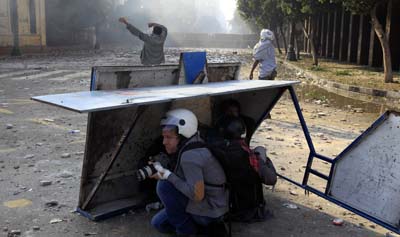The guidance is hardly clear. At a Columbia University event last week pegged to the release of the new CPJ Journalist Security Guide, one journalism student said he and his classmates are getting contradictory advice. Many J-school professors, he said, have encouraged him and others to just get up, go overseas, and try to make it as a freelancer. But the experienced journalists speaking at the event advised caution.
Pulitzer Prize-winning photojournalist Carolyn Cole noted that she has made many mistakes in her career, and it is better to make them closer to home where the risks may be lower than in an overseas war zone. Thomson Reuters news operations chief Stuart Karle made it clear that he is reluctant to take any material from freelancers unless he is confident that they are making sound decisions about risk.
But there are many other overseas stories to cover besides wars. Economic stories may seem dull at first blush, yet they challenge the skills of the best J-school graduate to understand and explain complexities that affect everyone’s lives. Following the flow of money in a society can help one understand how its undercurrents work. Cole similarly suggested that students find overseas stories such as elections, where interest is high and risk is manageable.
Many aspiring freelancers, however, gravitate to major war zones because stories are plentiful and interest is strong among news outlets back home. Some experienced journalists working in Libya recently complained how younger colleagues have arrived in war zones ill-prepared. A frightening number have little to no experience, equipment, or training. On one point, though, aspiring freelancers share a shortcoming with some of the most experienced freelancers: Many work without health or disability insurance.
At the Columbia University event, I encouraged students to consider the consequences of being injured or permanently disabled. What would happen then? Who would take care of you? What if you’re killed? Think of all the loved ones who would suffer. What if you survive and struggle with the emotional turmoil of post-traumatic stress?
I would encourage young journalists to consider a few other things, too, before embarking on any potentially dangerous story. I say this as a reporter who has taken risks–and both won and lost–and as someone who has told family members how their loved ones were killed. Even now, many years later, few days pass without thinking of them.
Journalists like to think of themselves as responding to a calling, or duty. For some journalists, there are stories that are worth taking a calculated risk to obtain–pieces that establish responsibility for organized rapes or massacres, for example, or reports that implicate powerful figures in corruption or organized crime. These are stories that would otherwise not be told.
Every high-risk decision brings both the potential of lasting, positive impact, and the possibility of permanent, tragic loss. Decisions about risk are highly personal, but the individual should be keenly self-aware. Your emotions come into play, as does adrenaline. A good story with an element of danger can bring with it a rush as compelling as sex or drugs.
In such a moment, you might be wise to ask yourself: Am I being driven by the emotions of the moment? How much of my decision is driven by ego? How much am I motivated by telling the story–and how much by the glory I might derive from telling it? Am I trying to prove something to myself or others? Perhaps every journalist is motivated by some incalculable mix of service and ego, intellect and emotion. Experience can help you better discern between duty, ego, and adrenaline.
My advice: Give yourself a chance to understand not only your coverage area, but yourself. There are plenty of tough stories to go around. If you really want to take on a dangerous beat, you’ll get your chance. So, yes, J-school students, your professors are right: Go ahead, go overseas. But start with a beat that allows you to learn–mainly about yourself.
